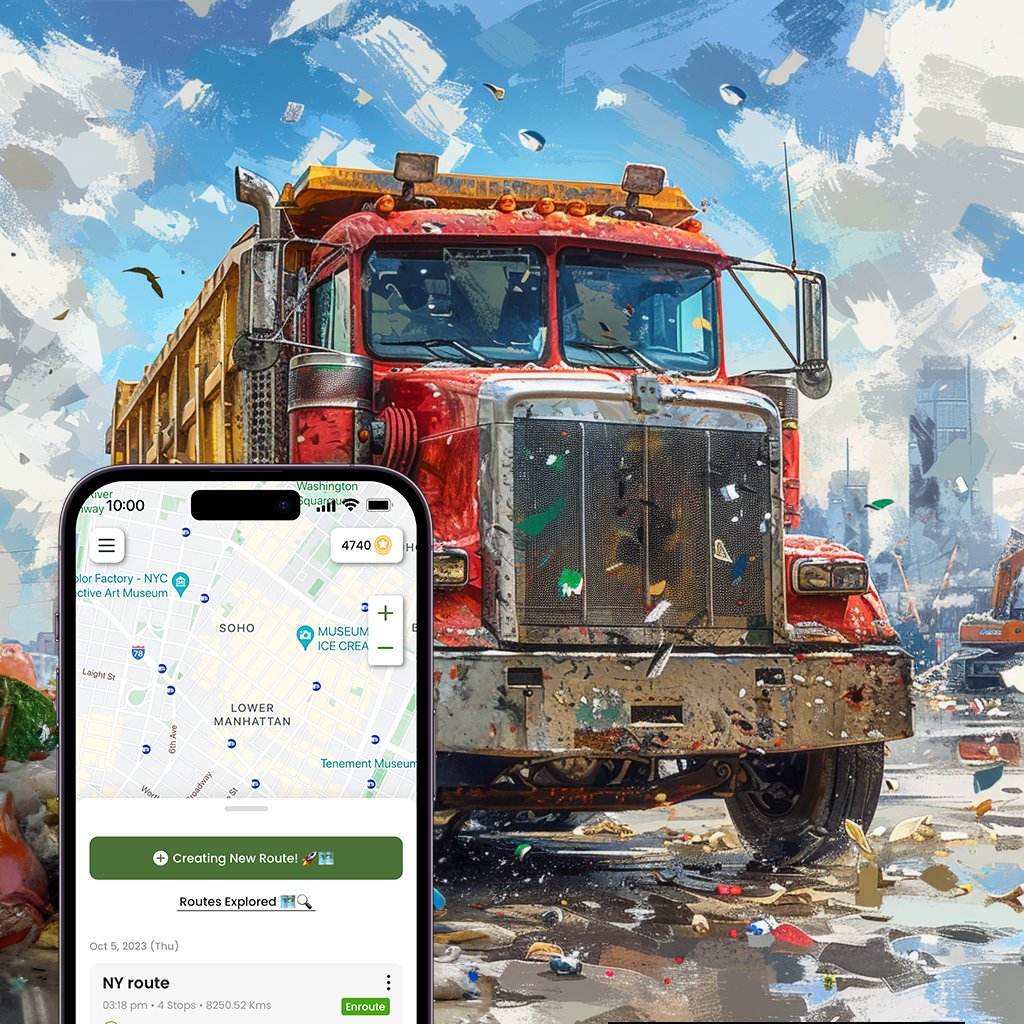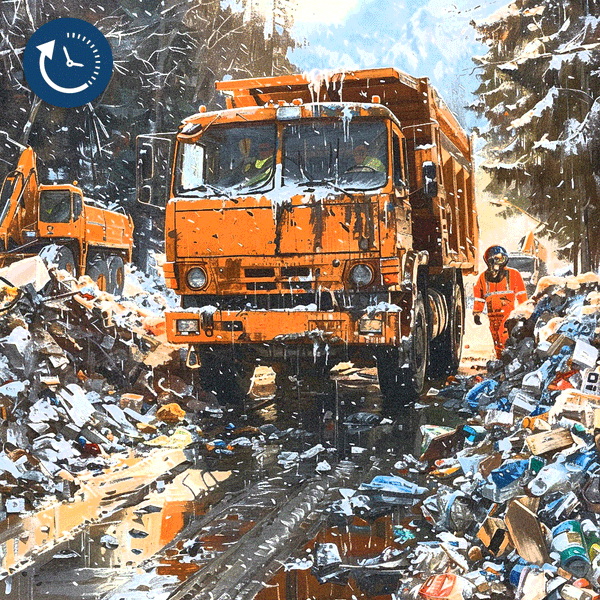As per the reports circulated by Grand View Research, the global waste management market size was valued at USD 1,293.70 billion in 2022, which is predicted to grow at a CAGR of 5.4% from 2023 to 2030.
As the industry expands, so does the need for stringent regulatory compliance.
Failure to comply with regulations governing waste management operations can result in significant fines, legal actions, and reputational damage for companies.
For instance, in the year 2021, the U.S. Environmental Protection Agency (EPA) imposed penalties totaling more than $15 million for violations of regulations related to waste management.
One such penalty was imposed on Dow Chemical Company and its subsidiaries for breaching Clean Air Act (CAA) regulations. Dow failed to operate and supervise flares at their petrochemical plants resulting in excessive emissions of harmful air pollutants.
However, traditional manual methods of route planning are inadequate, for handling the logistics associated with waste collection and transportation, particularly amidst increasing regulatory oversight.
To tackle these obstacles and navigate the landscape of compliance requirements, waste management enterprises are increasingly turning towards route planning solutions and optimization software.
So, without any further ado, let’s delve deeper into the regulatory landscape of waste management, explore the challenges faced by companies in achieving compliance, and examine how smart route planning offers a transformative solution to these challenges.
The Regulatory Landscape of Waste Management
The regulatory landscape of waste management varies depending on location. However, common regulations include:
1. Collection frequency
Regulations dictate how often specific waste types must be collected (e.g., weekly for household waste, and bi-weekly for yard waste).
2. Waste segregation
Authorities often mandate the separation of waste streams at the source (e.g., recyclables, organics, general waste) to facilitate proper disposal and resource recovery.
3. Disposal protocols
Specific waste types may require specialized disposal methods (e.g., hazardous waste requiring special permits and licensed facilities).
Please ensure that non-compliance with these regulations can result in hefty fines, permit suspensions, and reputational damage.
See What Smart Route Planning Promises
In response to these challenges, smart route planning has emerged as a game-changer for the waste management industry.
At its core, smart route planning utilizes advanced technologies such as:
- GPS tracking
- Geographic information systems (GIS)
- Predictive analytics to optimize waste collection and disposal routes
By analyzing real-time data on waste volumes, collection points, and traffic conditions, waste management companies can identify the most efficient routes and schedules, minimizing fuel consumption, and reducing greenhouse gas emissions.
Moreover, smart route planning enables waste management companies to improve compliance with regulatory requirements.
By ensuring timely collection and proper disposal of waste materials, companies can mitigate the risk of regulatory violations and associated penalties.
Additional Benefits of Smart Route Planning
Although complying with regulations is a major benefit, there are other benefits to smart route planning:
1. Improved operating efficiency
Fuel consumption and travel time are reduced via optimized routes, which saves money. See how DynoRoute, a software solution for intelligent route planning, significantly contributed to maximizing Tiger Sanitation’s efficiency.
2. Better customer service
Accurate and timely collections maximize client satisfaction and loyalty.
3. Reduced environmental impact
By using less fuel, optimized routes save mileage, promote sustainability, and eventually cut down on the carbon footprint of the waste management firm.
Key Considerations in Implementing Smart Route Planning
Successful implementation of smart route planning hinges on several key considerations. Have a look:
1. Data collection
First and foremost is to collect information on waste types, locations, collection regulations, and any existing route data. Waste management companies should also analyze comprehensive data on waste generation rates, composition, and disposal practices to inform route planning decisions effectively.
2. Data integration
Integration of technology is another critical factor. By harnessing the power of GPS tracking, GIS mapping, and predictive analytics, waste management companies can optimize route planning processes, identify inefficiencies, and make data-driven decisions.
3. Collaboration
Stakeholder engagement is equally vital in ensuring the success of smart route planning initiatives. By collaborating with regulatory agencies, local communities, and waste generators, companies can gain valuable insights into regulatory requirements, community preferences, and environmental concerns.
Best Practices for Implementing Smart Route Planning
To effectively leverage smart route planning for regulatory compliance, waste management companies should consider the following best practices:
- Integrated advanced route optimization software with other existing systems, such as fleet management, customer databases, and regulatory reporting tools.
- Ensure that all personnel involved in waste collection and waste transportation operations are thoroughly trained on the company's procedures, protocols, and the use of routing technologies in a way that they adhere to regulatory compliances.
- Maintain open communication channels with regulatory bodies and industry experts to stay informed about evolving regulations, best practices, and emerging technologies. Participation in industry associations and conferences is advisable to gain valuable insights and unlock new networking opportunities.
- Regularly reviewing and analyzing the performance of the smart route planning system, identifying areas for improvement, and making necessary adjustments to enhance efficiency and compliance.
Frequently Asked Question
What is smart route planning in waste management?
Smart route planning is a modern software solution that utilizes advanced technologies such as GPS tracking, GIS mapping, and predictive analytics to optimize waste collection and disposal routes. It analyzes real-time data on waste volumes, collection points, and traffic conditions to identify the most efficient routes and schedules.
Why is regulatory compliance important in waste management?
Regulatory compliance guarantees that waste management activities follow the rules and legislation that control the disposal, transportation, and collection of trash. In addition to harming the environment, noncompliance can result in penalties, legal action, and reputational damage for businesses.
How does smart route planning help with regulatory compliance?
Effective route planning guarantees timely collection and appropriate disposal of waste products, which aids waste management organizations in adhering to rules. It adjusts routes to maximize fuel economy, lower greenhouse gas emissions, and improve overall performance.
What are the key features to look into while integrating smart route planning software?
Key features that are must in a route planning and optimization software are advanced route optimization algorithms, real-time data integration, customization and flexibility, GIS mapping capabilities, mobile access, user-friendly interface, etc.
The Final Words
After these comprehensive guides on aligning regulatory compliances via
smart route planning, it becomes evident that embracing technology-driven solutions is no longer a luxury but a necessity for companies striving to thrive in this evolving landscape.
Together, let us forge ahead on this path of progress, where technology meets sustainability, and compliance becomes synonymous with excellence.








